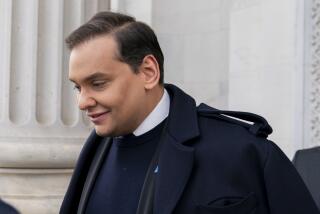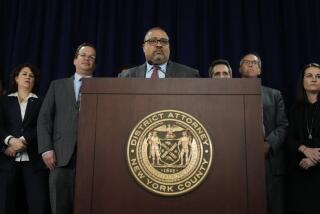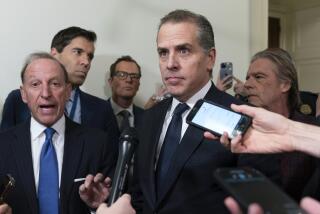Gates Set to Testify in Microsoft Trial
- Share via
WASHINGTON — In a bold but risky bid to fend off tough antitrust punishment of his company, Microsoft Corp. Chairman Bill Gates today is scheduled to testify in the landmark case.
The much-anticipated appearance by the world’s richest man will be the first time Gates has testified in court in person during Microsoft’s four-year antitrust battle with the government.
The move, which comes in the sixth week of the trial pitting Microsoft against nine states, is aimed at projecting a more compliant image of the software giant to a federal judge who will decide what punishment Microsoft should face for violating antitrust laws.
Gates “will address the evolution of the PC industry and ... speak to the potential harm to consumers and the industry posed” by the states’ remedy proposals, Microsoft spokesman Jim Desler said. “No one is better at talking about these issues than Bill Gates.”
Gates’ appearance also may help counter the damaging effect of his 1998 videotaped deposition in which he appeared aloof, forgetful and defensive.
In that video, Gates repeatedly said he could not recall key corporate events. But government lawyers contradicted his statements at the time by introducing incriminating e-mails and other documents that showed Gates had direct knowledge of many of the firm’s efforts to crush business rivals.
The video appeared to have a significant effect on the original trial judge in the antitrust case, who repeatedly urged Microsoft to put Gates on the stand and then--in an interview published after he ruled against the company--likened Gates to Napoleon.
A federal appeals court, saying the comments by U.S. District Judge Thomas Penfield Jackson showed bias, reversed the jurist’s order to break up Microsoft. But the appeals panel upheld Jackson’s ruling that Microsoft violated antitrust laws by using its flagship Windows software to thwart competition from software rival Netscape Communications Corp., which was later acquired by America Online Inc. The appeals court directed the district court to replace Jackson.
Shortly after the appointment of U.S. District Judge Colleen Kollar-Kotelly to the case last fall, the company announced that Gates would testify. But few experts believed the brilliant but volatile software mogul would take the stand because of the risk that he might tip the balance against the company in a closely fought antitrust case.
Lawyers present when Gates was deposed in February for the current trial proceedings said he did much better than in the first deposition. The deposition from February has not been released. But the performance apparently gave Microsoft confidence that Gates might be an asset on the witness stand.
“He was animated and much more easygoing than the first time around; he even cracked a few jokes,” said one lawyer who was present.
Gates’ levity may dissipate in what experts expect to be a tense showdown between Gates and the states’ lead trial lawyer, Brendan V. Sullivan Jr.--one of Washington’s best-known litigators.
Sullivan, who hasn’t cross-examined any Microsoft witnesses or spoken at length in court since his opening statement March 18, could confront Gates with portions of his earlier video deposition or use incriminating e-mails to discredit the software executive. Legal experts say Sullivan will be limited in his cross-examination by the scope of Gates’ direct testimony.
If Gates’ direct testimony concerns only the general development of the PC industry as Microsoft has indicated, Sullivan may have a tough time capitalizing on the company chairman’s courtroom appearance.
Experts say that since Microsoft reached an out-of-court settlement with the Justice Department in November and avoided a court-ordered breakup, Gates may have more to gain--and the states more to lose--by speaking out on behalf of his company.
“The upside for Microsoft, it seems to me, is greater than the downside,” said Andrew Gavil, an antitrust expert and law professor at Howard University.
Gates, Gavil added, has “been the shadow defendant in the case all along. And if anyone is going to make the case for Microsoft that the states’ remedies are harsh and unnecessary, it is Mr. Gates.”
Some longtime observers of Microsoft, however, said Gates’ volatile personality still makes it risky to put him on the witness stand.
“Bill Gates has a tendency to think he can outsmart people,” said Rob Enderle, a senior technology analyst for Giga Information Group Inc. in Santa Clara. “He’s a smart guy. But [cross-examination] is what these lawyers do for a living. I think his appearance is ill-advised. If he wants to [burnish] the image of Microsoft ... the place to do it is not in the courtroom.”






